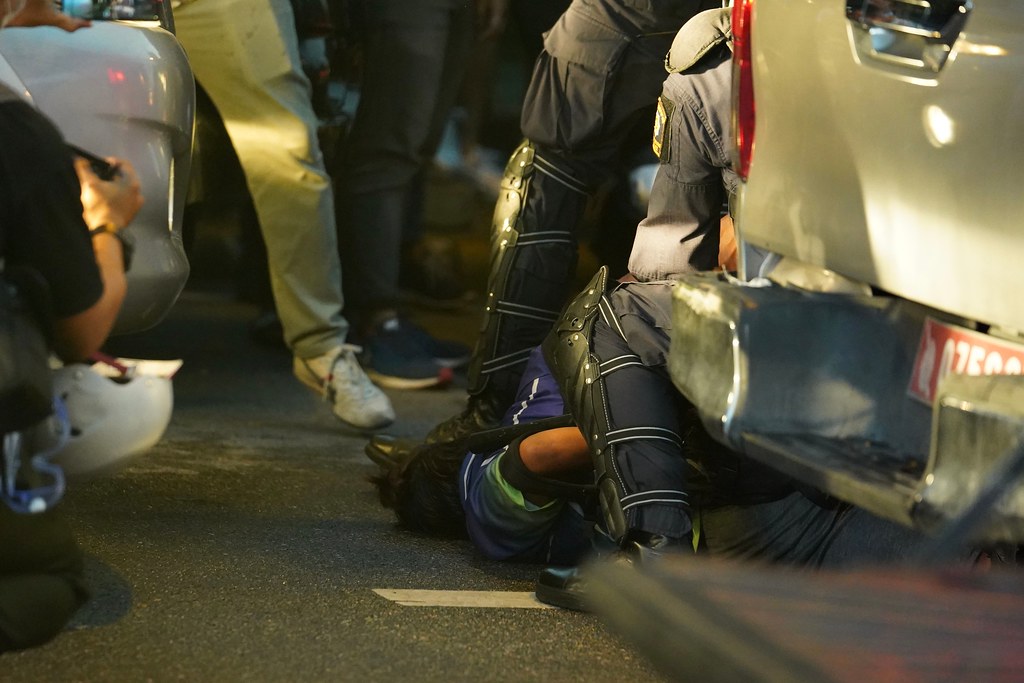An investigation by the National Human Rights Commission (NHRC) found that police officers have used excessive force during operations against pro-democracy protesters and that there have been many instances of human rights violations.

A protester was pushed to the ground and arrestedby crowd control police during a protest on 27 September 2021 (Photo by Ginger Cat)
At a press conference on 24 December 2021, the NHRC announced the result of its investigation into human rights violations during pro-democracy protests in July – September 2021.
The investigation found that the state of emergency, declared in March 2020 to curb the spread of Covid-19, has been used to control political gatherings, and that the Emergency Decree tends to be used to prohibit all gatherings without balancing between freedom of assembly and public health. Protesters are also arrested and charged with violation of the Emergency Decree, creating a fear of exercising the right to freedom of assembly, which is a violation of human rights.
The NHRC also found that crowd control police have used inappropriate measures against protesters, such as using their batons in a way that could cause serious injuries, firing rubber bullets at head level, or firing tear gas into residential areas. This goes against the crowd control measures guidelines as outlined in the 25 August 2015 Cabinet Resolution and the UN Human Rights Guidance on Less-Lethal Weapons in Law Enforcement. The investigation found that protesters have been injured during arrest, such as by being shot with rubber bullets or because their vehicles were blocked by officers’ vehicles. The NHRC said that even though protesters may exhibit violence, it is not necessary for officers to use violent measures to arrest them without regard for the consequences, especially in cases where a minor is being arrested. These actions are therefore excessive and inappropriate, violating the protesters’ human rights.
The investigation also found that police officers used cable ties to restrain minors who are not trying to escape or obstruct officers’ operation, and that there have been cases of minors being held together with adults, and of protesters being taken to locations which are not the local police station, such as the Border Patrol Police Region 1 headquarters. Lawyers are also prevented from seeing arrested protesters to provide legal assistance, while officers have not informed detainees of the charges and their rights and prohibited them from contacting relatives, which contravenes legal procedures.
The NHRC notes that several protesters have been denied bail due to violation of their bail condition or repeated offences. The NHRC believes that even though the decision to grant bail is at the court’s discretion, it should uphold the principle that everyone has the right to temporary release in accordance with the Constitution and the International Covenant on Civil and Political Rights (ICCPR), which states that those facing legal prosecution should be presumed to be innocent until a verdict is reached.
The NHRC also notes that many protests in July – September 2021 were “car mobs” or “bike mobs” which involved driving vehicles to various locations, which shows an intention to prevent the spread of disease. The protesters were peaceful, and instances of violence occurred after the conclusion of the protests. This kind of protest, as well as marches and flashmobs, are an exercise of freedom of peaceful assembly. The NHRC said that protests without a clear leadership in which protesters use weapons against police officers are violent protests and officers may use legal measures against them as long as the measures are proportional, especially in cases where protesters are minors.
The NHRC notes that currently there is no legislation protecting those who are affected by political conflict, and recommends that legislation or regulations are passed to fill this gap.
The NHRC also found that officers tend not to separate children from adults during protests and that they treat children in the same way that they would treat adults both in terms of crowd control measures and the judicial process.
In order to prevent further violations of human rights, the NHRC recommends that the police do not use razor wire as crowd control equipment and improve crowd control police operations so that they are in line with the law and international principles. They must also grant every detainee the rights to which they are entitled in the judicial process and avoid preventing detainees from receiving legal assistance.
The NHRC recommends that the Cabinet should avoid declaring a state of emergency to control protests, as the Emergency Decree’s objective is to prevent serious threats to national security, not political protests. The Ministry of Justice should also draft legislation or regulations to compensate those who are affected by political protests, while the Royal Thai Police should issue crowd control guidelines with a focus on protecting detainees’ rights and avoiding charges which limit the exercise of freedom or create excessive burden for detainees. The courts should also develop guidelines on granting bail which are in line with the constitution and the ICCPR, as well as considering other measures in lieu of imprisonment.
The NHRC also recommends that protesters make sure protests are peaceful and without weapons. They should also assess the risk that comes with protests and the spread of Covid-19, as well as creating safe spaces for children. There should also be a communication channel between protest organisers and police officers to keep protests in line with international principles.
Prachatai English is an independent, non-profit news outlet committed to covering underreported issues in Thailand, especially about democratization and human rights, despite pressure from the authorities. Your support will ensure that we stay a professional media source and be able to meet the challenges and deliver in-depth reporting.
• Simple steps to support Prachatai English
1. Bank transfer to account “โครงการหนังสือพิมพ์อินเทอร์เน็ต ประชาไท” or “Prachatai Online Newspaper” 091-0-21689-4, Krungthai Bank
2. Or, Transfer money via Paypal, to e-mail address: [email protected], please leave a comment on the transaction as “For Prachatai English”
